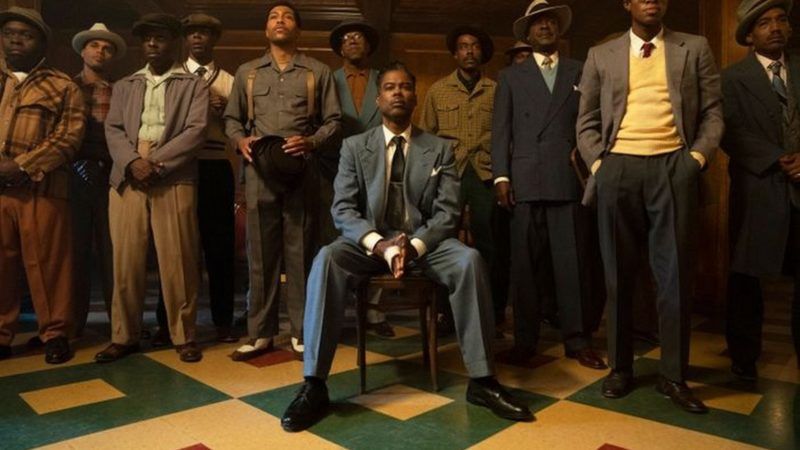Fargo Goes Full Gangster in Season Four
Chris Rock heads cast of mobsters in 1950s Kansas City.

Fargo. FX. Sunday, September 27, 9 p.m.
Halfway through the plague-abbreviated fall broadcast TV rollout, it's time for a break. Actually, there are two new NBC shows debuting this week. One is Connecting, a stab at a Friends for quarantine times. The other is a remake of the pillory-the-contestants quiz show The Weakest Link, with Jane Lynch of Glee replacing Brit Anne Robinson in the Ilsa-She-Wolf-of-the-Game-Show-SS role as hostess. But NBC didn't make either of them available to critics in time for review, generally not a sign of intellectual heft, cutting-edge humor or even bare intelligibility, so watch at your own risk—the usual Reason warranty on lost or damaged brain cells is not in effect.
Happily, the cupboard is not bare. FX's Fargo returns after an absence of three years, with no discernible diminution of bloodlust, contempt for its fellow man, or general weirdness.
In one fundamental way, Fargo—an anthology series with no returned characters or plot continuity, based on the 1996 Coen brothers film of the same name—is quite different from previous seasons. Usually the show kicks off a little story about ordinary people. Something happens, typically a crime, things go out of control, and we get to see how leeringly evil regular human beings can turn.
Perhaps series creator Noah Hawley thinks his point about our core immorality is made, because this edition of Fargo—set in Kansas City in 1950—makes no pretense of human decency. From the first frame, it's a tale of ethnocentric gang warfare: the Jewish mafia against its Irish counterparts, the Irish against the Italians, and—finally, center stage—the Italians against the blacks.
The story plays out as cockeyed, multicultural version of The Godfather, with sidebars on immigration, assimilation and, inevitably, race. Black gang boss Loy Cannon, played by Chris Rock, owns a bank, is a deacon in his church and a loving father to his children. But he also fixes fights and runs numbers and prostitution rackets.
His Italian rivals, the Fadda brothers, are almost directly out of The Godfather. Josto (Jason Schwartzman, The French Dispatch), prematurely seated family chief after the accidental death of his father, is a slightly less flighty version of Fredo Corleone, uncertain and disposed to compromise rather than clashes. His brother Gaetano (Italian TV star Salvatore Esposito), only recently arrived from Sardinia, is an even more hotheaded version of Sonny Corleone, squirming with sociopathic impulses.
With Cannon wanting to expand his territory and the Faddas not interested in giving anything up, conflict seems likely. The bosses try to work things out like a couple of midwestem Franz Fanons. "I know you think being part of an American is standing on my neck," Cannon tells the Italians. "But I've seen the window signs. 'NO COLORED, NO ITALIANS.' So we're both in the gutter together, like it or not."
But post-colonial theory is no match for mafioso rage. And the presence of some oddball interlopers doesn't help.
The most problematic is a Mormon federal marshal (Timothy Olyphant) on the hunt for some escaped bank robbers, who dispenses breezy bits of racist 1950s folk wisdom with the same alacrity with which he ignores rules about search warrants and other law enforcement niceties. "I tracked a one-eyed Mexican all the way to the ocean once," he boasts during a stakeout. "I caught him trying to paddle to China."
Much as his career anecdotes enliven surveillance shifts, the pinwheel-eyed nurse Oraetta Mayflower (Jessie Buckley of HBO's Chernobyl) goes him one better as she dispenses unsolicited handjobs to Italian mobsters spying on the black gang. The mobsters might be even further diverted if they knew she's pulled off more hits than they have, dispatching her patients with poisonous injections and crimped oxygen hoses on fits of macabre whimsy.
Buckley's daft performance is the star turn of a very talented cast. (Exception: Rock, who lacks the gravitas necessary to play a mafia boss, tries hard, but can't rid himself of a little half-smirk that makes him look continuously on the verge of breaking into an old Saturday Night Live monologue.)
Evaluating the rest of the show, however, is more difficult, particularly its attempt to establish a moral footing for itself. (If, indeed, that's supposed to be taken seriously; Fargo's ability to needle itself should never be underestimated.) I'm certain America has no shortage of racism, but somehow I'm not very moved by a lack of awareness of all the barriers to advancement to ethnic gangsterism. And in any event, Fargo's body-count is a salute to an equal-opportunity America. Advises one character: "There's a place for all of us on this earth. We just have to find it." In Fargo, that's almost always in a coffin.


Show Comments (20)